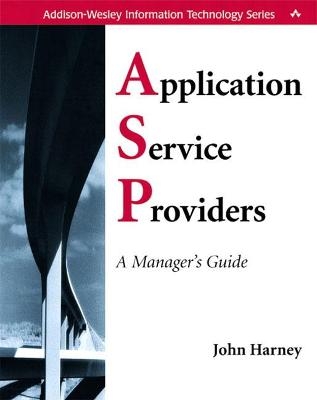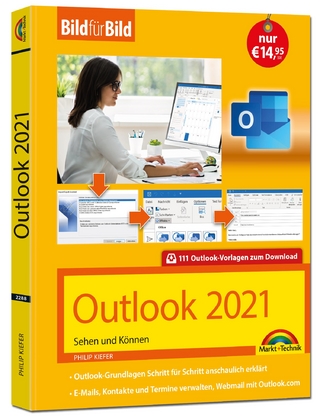
Application Service Providers (ASPs)
Addison Wesley (Verlag)
978-0-201-72659-6 (ISBN)
- Keine Verlagsinformationen verfügbar
- Artikel merken
The benefits of working with Application Service Providers (ASPs) can be compelling -- faster rollouts, lower costs, less time spent on implementation and maintenance, and a greater opportunity to focus on your organization's core competencies. Unfortunately, the risks of ASP relationships are far from insignificant. In this book, the President of ASPWatch shows IT managers exactly how to navigate the risks, and use ASPs for maximum competitive advantage. John Harney presents a complete roadmap for any IT decision-maker considering outsourcing to ASPs. He offers expert guidance for answering questions like: What costs are involved? How secure and viable is your ASP? How do you choose the right ASP? You'll learn practical criteria for identifying possible ASP partners; choosing amongst ostensibly similar ASPs; evaluating services, performance, and ROI; and negotiating service level agreements that meet your business requirements. For everyone considering or using Application Service Providers, including IT executives and managers, line-of-business managers, Web and e-business professionals, and consultants.
John Harney is President of ASPWatch, Inc., a consultancy that delivers market, partner, and technology strategy for ASPs and companies launching ASP services. He specializes in evaluating ASP services, as well as developing marketing campaigns and feature articles for ASPs in major IT magazines. As the editor of four computer publications, he has reported on the IT industry since 1986. 0201726599AB10182001
Preface. Acknowledgments. 1. The Tangled Roots of the ASP Phenomenon. New Technology. New Network. New Implementation Model. New Network Outsourcing Model. New Competition. New Mergers and Acquisitions. New Alliances. New Value Proposition. New Industry. Key Concepts. 2. The ASP Coalition-No Single Vendor Can Do It All. The ASP Hardware. The Hardware Platform Components. The Key Characteristics of ASP Hardware. Types of ASP Hardware Providers. The ASP Network. The Network Platform Components. The Key Characteristics of an ASP Network. Types of ASP Network Providers. The ASP Software. The ASP Software Components. The Key Characteristics of ASP Software. Types of ASP Software Providers. ASP Market and Application Expertise. Infrastructure Service Providers. ASP-Enabling Software Platforms. Value-Added Services. Key Concepts. 3. The ASP Hardware Platform. Hardware Components. Hardware Provisioning. Server Clustering. Load Balancing. Web Server Caching. Characteristics of ASP Servers. Key Concepts. 4. The Data Center. Availability. Data Backup. Natural Disasters. Responsiveness. Updating and Testing Disaster Recovery Plans. ASP Partner and Alternate Site Backup. Environmental Control. Key Concepts. 5. The ASP Network. The ASP Network-An Overview. Access-ASP to Broadband WAN. The Broadband WAN. Frame Relay. ATM. ATM and Frame Relay Interworking. WDM. Access-Broadband WAN to Customer. The Local Loop-ISDN, xDSL, and Cable Modems. Wireless. IP. Key Concepts. 6. Varieties of ASP. Pure-Play ASPs. FSPs. VAR ASPs. Service Bureau ASPs. SI ASPs. ISV ASPs. Related Service Providers. Key Concepts. 7. Security Issues for ASPs. Determining Your Security Risks. Types of Security Risk. Security Techniques. Authentication. Encryption. Access Control. Integrity. Confidentiality. Audit and Accounting. Security Equipment. Routers. Firewalls. Proxy Servers. Customer Requirements and ASP Strategy. Appropriate Security. Prioritizing Security Threats. Security Tiers. Security Policies. Different Rules for Different Users. Types of Confidentiality. Security Audits. Physical Security. Key Concepts. 8. ASP Service-Level Agreements. The Network SLA. Network Availability. Network Throughput. Network Redundancy. Network Equipment. Network Scalability. Network Peering Arrangements. Network Delay. Network Service-Level Corroboration. Network Reporting. Network Provisioning. Network Support. Planned Network Outages. Unplanned Network Outages. The Application SLA. Application Availability. Application Performance. Application Redundancy. Application Platform. Application Scalability. Application Security. Customer Application Administration. Application Monitoring. Application Service-Level Corroboration. Application Reporting. Application Provisioning. Application Support. Planned Application Outages. Unplanned Application Outages. General Practices. Key Concepts. 9. ASP Pricing Models. The Major Types of Pricing Models. Other Fees. Real-World Examples of ASP Pricing Models. Key Concepts. 10. ASP Customer Service and Technical Support. Up-Front Customer Service. Hosted Application Implementation. Client Preparation. Customization. User Policies. Data Conversion. Testing and Quality Assurance. Training. Going Live. Routine Maintenance and Upgrades. Technical Support. Monitoring and Reporting. Call Centers. Billing and Mediation. General Expectations. Key Concepts. 11. Enabling Technologies for ASPs. Virtual Private Networks. Different Types of VPNs. Value-Added Characteristics of Different Providers' VPNs. Networked Storage. Storage Area Networks. SANs' Value Proposition. Network Attached Storage. SAN + NAS + HSM. Why Lease Networked Storage from an ASP? Enterprise Portal Interfaces. Wireless. M-commerce. WASPs. Key Concepts. 12. The ASP Channel. The Double Channel. SI ASP Strategies. Hardware Vendor ASP Strategies. ISV ASP Strategies. Rebranding and the Value-Added Channel. ASP Channel Winners and Losers. Key Concepts. 13. What's Ahead for ASPs? The Data Center of the Future. Wide Area Storage. The Coming Value-Added Internet. The Microsoft Factor. Tribal Commerce within ASP Conglomerate Communities. Winning and Losing ASP Strategies. The Human Factor. Key Concepts. Appendix A: Guide to Location of ASP Case Studies in Different Chapters. Appendix B: xSPs (ASP-Enabling Companies). Appendix C: Selected ASPs in Major Vertical Markets. Appendix D: Selected ASPs Offering Major Types of Hosted Applications. Appendix E: Defining Your Low-Level ASP Requirements. Appendix F: ASP Organizations and Publications. Bibliography. Glossary. Index. 0201726599T10242001
| Erscheint lt. Verlag | 4.12.2001 |
|---|---|
| Reihe/Serie | Addison-Wesley Information Technology Series |
| Verlagsort | Harlow |
| Sprache | englisch |
| Maße | 235 x 186 mm |
| Gewicht | 581 g |
| Themenwelt | Mathematik / Informatik ► Informatik ► Netzwerke |
| Informatik ► Office Programme ► Outlook | |
| Wirtschaft ► Betriebswirtschaft / Management ► Allgemeines / Lexika | |
| Wirtschaft ► Betriebswirtschaft / Management ► Marketing / Vertrieb | |
| ISBN-10 | 0-201-72659-9 / 0201726599 |
| ISBN-13 | 978-0-201-72659-6 / 9780201726596 |
| Zustand | Neuware |
| Informationen gemäß Produktsicherheitsverordnung (GPSR) | |
| Haben Sie eine Frage zum Produkt? |
aus dem Bereich


